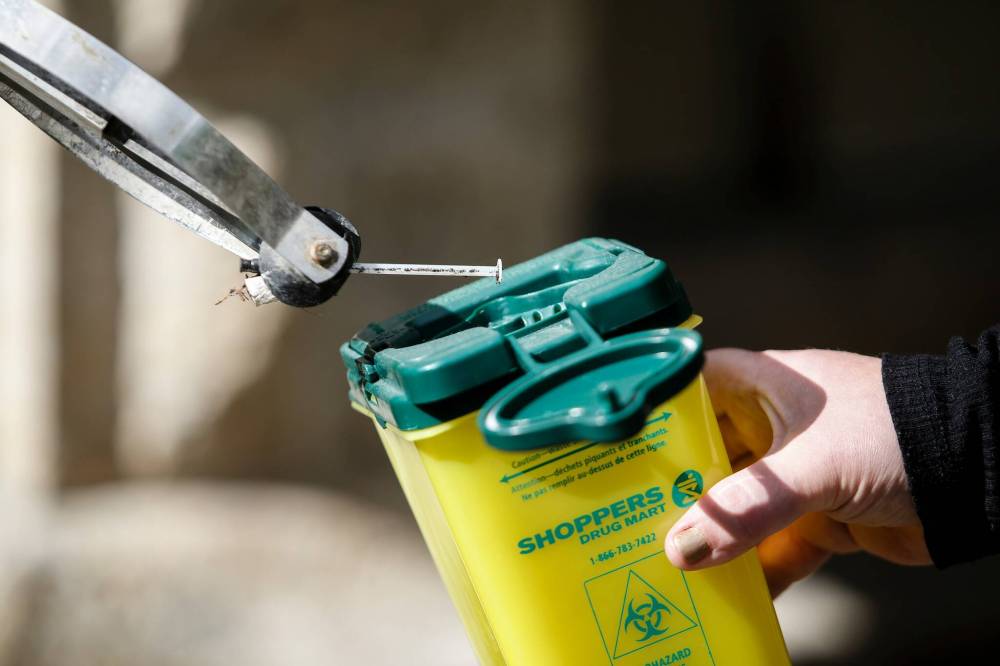The city could hire crews to remove needles and weapons discarded at parks but a key supporter of the change fears its price tag will prevent action.
A new city report costs out two options to ramp up the removal of needles, weapons and other sharp objects at 36 “priority parks,” after residents complained the dangerous debris makes it tough for kids to play outside some daycares.
“Needles and weapons found in parks are an increasing concern for Winnipeggers,” writes Dave Domke, the city’s manager of parks and open space, in the report.

JOHN WOODS / FREE PRESS FILES
A new municipal report costs out options to increase used-needle cleanup at 36 Winnipeg parks.
The report doesn’t recommend a strategy, but lays out options for regular, proactive cleanups, should city council approve funding.
In the first option, the city would hire and deploy two crews of four people to monitor parks from April to October with a goal to visit each site daily, which would cost $193,704 per year. In the second, the city would deploy two crews of four to monitor park locations from April to October and one crew of two from November to March, at a price of $262,884. The winter monitoring would be less frequent, since fewer needles tend to be found during that season, the report notes.
Coun. Cindy Gilroy, who advocated for the daily removal of needles and weapons from parks within “higher needs” areas, said she fears city council won’t approve funding to pay for the changes.
“Of course, I am going to be asking for this to (be funded) but… every time I have to ask for more money, it’s just a barrier for me to getting this work done,” said Gilroy (Daniel McIntyre).
The councillor said the city could explore partnerships with community groups that already handle some trash pickups and redeploy existing staff to complete the work at a lower cost.
She stressed the debris presents serious risks that must be addressed.
“Kids are at play right where there’s needles, where there’s drug use and I think that is a huge concern…. You don’t want a kid picking up a machete. You don’t want kids picking up glass or playing in glass,” said Gilroy.
She noted a daycare previously reported finding used needles, opioid overdose medication, human waste, garbage, knives, ammunition, broken glass, weapons and bear-spray canisters at downtown greenspaces.
Coun. Vivian Santos, chairwoman of council’s community services committee, said the price of the potential cleanups is a concern.
“Our budget is pretty stretched to the limit. I think we have some competing priorities with other city councillors, when it comes to dealing with encampments and poverty. So, at this time, I’ll be supporting the administration’s suggestion to receive it as information,” said Santos (Point Douglas).
Receiving the idea as information would mean taking no action on the cleanup options.
Santos said the city needs to work out a long-term solution with the province and other groups that provide needles to Winnipeggers to safely dispose of them, which would help prevent a buildup in public spaces.
“We want to continue to work with Manitoba Health and harm-reduction groups to find more of a long-term solution to keep those needles out of our parks and public spaces,” she said.
The city must also avoid funding matters outside of its own jurisdiction, such as addictions and mental-health supports, which are provincial responsibilities, Santos said.
City staff already monitor for dangerous debris while providing other services, such as gardening, litter pickup or responding to 311 complaints, and immediately remove needles at those times, according to the report.
While the city and local service agencies have provided containers to safely collect needles, these have proven “not very effective,” the report notes.
The community services committee is expected to consider the cleanup options on Nov. 4.
joyanne.pursaga@freepress.mb.ca
X: @joyanne_pursaga

Joyanne Pursaga
Reporter
Joyanne is city hall reporter for the Winnipeg Free Press. A reporter since 2004, she began covering politics exclusively in 2012, writing on city hall and the Manitoba Legislature for the Winnipeg Sun before joining the Free Press in early 2020. Read more about Joyanne.
Every piece of reporting Joyanne produces is reviewed by an editing team before it is posted online or published in print — part of the Free Press‘s tradition, since 1872, of producing reliable independent journalism. Read more about Free Press’s history and mandate, and learn how our newsroom operates.
Our newsroom depends on a growing audience of readers to power our journalism. If you are not a paid reader, please consider becoming a subscriber.
Our newsroom depends on its audience of readers to power our journalism. Thank you for your support.